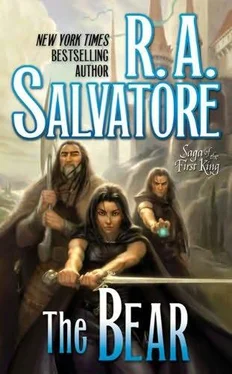R. Salvatore - The Bear
Здесь есть возможность читать онлайн «R. Salvatore - The Bear» весь текст электронной книги совершенно бесплатно (целиком полную версию без сокращений). В некоторых случаях можно слушать аудио, скачать через торрент в формате fb2 и присутствует краткое содержание. Жанр: Фэнтези, на английском языке. Описание произведения, (предисловие) а так же отзывы посетителей доступны на портале библиотеки ЛибКат.
- Название:The Bear
- Автор:
- Жанр:
- Год:неизвестен
- ISBN:нет данных
- Рейтинг книги:3 / 5. Голосов: 1
-
Избранное:Добавить в избранное
- Отзывы:
-
Ваша оценка:
- 60
- 1
- 2
- 3
- 4
- 5
The Bear: краткое содержание, описание и аннотация
Предлагаем к чтению аннотацию, описание, краткое содержание или предисловие (зависит от того, что написал сам автор книги «The Bear»). Если вы не нашли необходимую информацию о книге — напишите в комментариях, мы постараемся отыскать её.
The Bear — читать онлайн бесплатно полную книгу (весь текст) целиком
Ниже представлен текст книги, разбитый по страницам. Система сохранения места последней прочитанной страницы, позволяет с удобством читать онлайн бесплатно книгу «The Bear», без необходимости каждый раз заново искать на чём Вы остановились. Поставьте закладку, и сможете в любой момент перейти на страницу, на которой закончили чтение.
Интервал:
Закладка:
He noted, too, many weapons leveled his way.
"I am not your enemy," he said.
An old woman sifted through the crowd. She was thin, very thin, with a hunched back, but despite her advanced age-Bransen figured that she had to be near to ninety years old-her hair was still dark and barely tinged with gray.
"Then why are ye here?" she asked. Bransen's scrutinizing gaze prompted her to add, "Eireen's me name, and Pollcree's me town."
"The Dame of Pollcree?"
"Bah, but Pollcree's not a holding, just a town," she corrected. "Part o' Laird Binyard's lands, but he's dead now, o' course, and his garrison's scattered and the lands are in ruin."
"The Governess of Pollcree, then," Bransen said with a bow.
"As good a title as any, for what any're worth."
"I am here as the advance messenger for the army of Dame Gwydre of Vanguard, who has joined with the brothers of St. Mere Abelle…"
"Brothers o' what?"
"Chapel Abelle," Bransen clarified. "Now St. Mere Abelle. The monks who serve the memory and desires of Father Artolivan."
"Memory? He dead, too?"
Bransen nodded. "Peacefully so, and with his successor picked, and with a new mission for the brethren." He stepped back to take in more of the audience as he finished. "To oppose the war and the men who claim dominion at the end of a spear. The brothers are to serve the townsfolk, not to support the armies that march and ravage the land."
"Didn't ye just say ye was in front of an army, then?" Eireen asked.
"But an army that has entered Pollcree in peace, good governess. Not to burn your buildings but to repair them." That brought more than a few whispers about the cave, and more and more people gathered around.
"Do send your scouts to confirm my words. Five thousand men and women, repairing homes and finishing the work in the fields… well, as much as two days will allow, for that is all that we have, with Laird Milwellis and a vast force in pursuit of us. We wish to be away long before he nears, that he'll turn aside from Pollcree and not march through your fair town.
"And Dame Gwydre herself will arrive here soon. Yes, we know of this place, and it was not happenstance that brought me here. She will come with brothers carrying gemstones to heal the wounds of your people and with stocks of food for the people of Pollcree. Our hunters have been busy of late, the game surprisingly plentiful."
"At what cost?"
"None."
Eireen looked at him skeptically, as did many others.
"Dame Gwydre will defeat Laird Milwellis and Yeslnik, who calls himself king," Bransen assured her. "And she will rule Honce as she has ruled Vanguard, a servant of her minions, who would see to their health and well-being in the knowledge that such will promote a stronger and more prosperous land for all."
"Ye said ye were against war."
Bransen shrugged. "Some stubborn people simply will not surrender, I fear."
"Ye're crazy."
"I have been called that and worse." From outside the cave came word that a small force of soldiers and porters and monks neared the hillside. "But no matter," Bransen finished. "For Pollcree, the present is good, whatever the ultimate result. Come and meet Dame Gwydre, I bid you. Have your sick and injured gather and prepare your cooking fires for a meal long overdue and long deserved."
What choice did the folk of Pollcree have? They were no army, and the few among them who could fight would have been slaughtered to a man and woman had they attacked even the fraction of Dame Gwydre's army that accompanied her to the caves that hot summer day. And any thoughts they had of resisting, even of doubting, diminished quickly, as the monks went to the task of using the soul stones on the sick and injured and as piles of food-good and fresh food-were set before the caves.
Eireen did send scouts to the town proper, and they returned excited and grinning widely, with reports of ongoing repairs to roofs and walls and many crops being put in. Suddenly what had seemed assuredly a disastrous harvest was given promise, though much of the season was past.
The critical moment of the entire encounter came as midday passed, when Bransen happened upon a secret back chamber of the cave and found within a group of nearly fifty men and women, young and healthy.
"Dame Gwydre," he called. "You will see this." Many of the twoscore and ten before him put their heads down in despair. Some wept, for they had been through this before.
Gwydre, Brother Pinower, and Dawson arrived beside a protesting Eireen and with scores of townsfolk behind them.
"Well now, what have we here?" Dawson asked.
"Deserters," Bransen reasoned.
"Ye're not to take them!" Eireen yelled sharply at Gwydre, but the younger woman held up her hand, and her commanding presence set Eireen back on her heels.
"You have tired of war, and who can blame you?" Dame Gwydre said to the frightened group. "I'll not ask which side you fought for, for it hardly seems to matter now." She turned to the monk. "Brother Pinower, fetch your brethren and tend to these poor souls."
"I'm not fighting!" one woman yelled from the back.
"No," Gwydre said before others could chime in. "Nor do I ask that of you. You have nothing to fear from me and mine. We come not as conquerors and surely as no press-gang! But do come forth from this hole. There is food aplenty!"
"At what cost?" one man near to Gwydre asked sharply.
"I charge you with continuing the work here at Pollcree," Gwydre answered without hesitation. "Your weapon is a plow or a hoe or a mallet, if need be. That is the price I place upon you, if you are to partake of the healing magic and the foodstuffs. What say you?"
They said little and moved tentatively, as did the other off-balance townsfolk, for none had expected anything quite like this. For years, they, like many of Honce's other towns, had been battered by the march of one army after another, their healthy, young adults whisked away to fight for Ethelbert or for Delaval or for Yeslnik-it mattered not at all.
But Dame Gwydre kept her word, and for two days her monks and soldiers tilled and planted, hammered and split wood, healed and gave food, and then, with Milwellis turning toward her from the north, she bid Pollcree farewell and marched her army off to the southwest.
Indeed, she and her forces were planting more seeds than those in the fields.
And they continued to sow, day after summer day, in villages across the north-central region of Honce. Sweat beaded on Laird Milwellis's sunburned face as he surveyed the rolling fields before him. Dame Gwydre was supposed to be here. Every report had indicated that her march would take her to this very spot and in a time frame that allowed Milwellis to arrive first.
But she wasn't here.
"I assured King Yeslnik that battle would be joined in this time and place," the laird said quietly to Harcourt, riding at his side.
"Her force is smaller and more nimble," Harcourt replied.
That did little to comfort Milwellis. For weeks now, as summer had passed its midpoint, he had been in pursuit of the elusive dame. Time and again, Milwellis had marched into a town to discover that Dame Gwydre's army had passed through only a few days-once, only a few hours!-prior and then had vanished like ghosts into the countryside.
Every ambush he had set had been missed or ambushed in turn, and always in that hit-and-run style, a quick skirmish with little real damage to either side, though with more to Milwellis's ranks, invariably.
Milwellis glanced around at his vast army, at the tired and sweaty faces. The damage he saw there, not measured in blood, was all too real.
"Do you think Gwydre grows as weary of this as I do?" he said.
"Do you?"
Milwellis looked at Harcourt directly and grimly and shook his head. "The townsfolk grow to love her and supply her forces and cheer their passage."
Читать дальшеИнтервал:
Закладка:
Похожие книги на «The Bear»
Представляем Вашему вниманию похожие книги на «The Bear» списком для выбора. Мы отобрали схожую по названию и смыслу литературу в надежде предоставить читателям больше вариантов отыскать новые, интересные, ещё непрочитанные произведения.
Обсуждение, отзывы о книге «The Bear» и просто собственные мнения читателей. Оставьте ваши комментарии, напишите, что Вы думаете о произведении, его смысле или главных героях. Укажите что конкретно понравилось, а что нет, и почему Вы так считаете.










